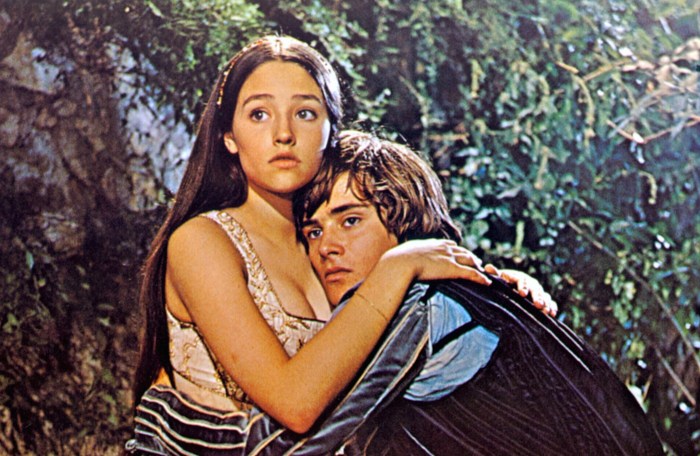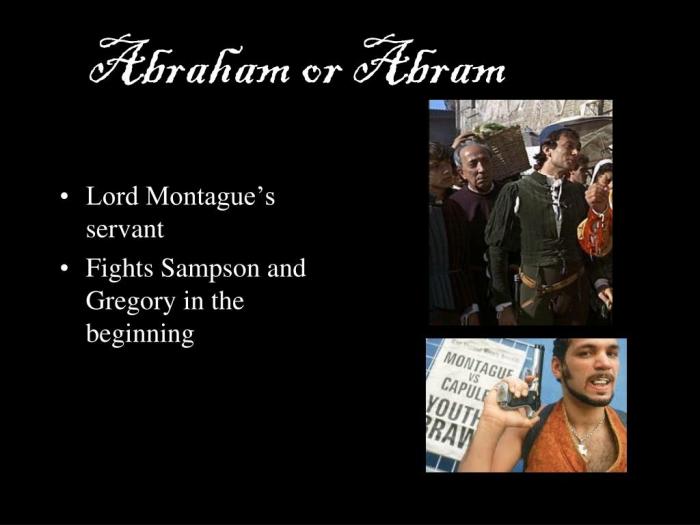Abram in romeo and juliet – In William Shakespeare’s timeless masterpiece, Romeo and Juliet, the character of Abram, the apothecary, plays a pivotal role in the play’s tragic events. As the dispenser of the fateful poison that ultimately leads to the lovers’ demise, Abram’s actions and motivations have been the subject of much debate and analysis.
This exploration of Abram in Romeo and Juliet delves into the character’s significance, examining his role in the play’s plot, his relationship with Romeo, and the moral implications of his actions. By analyzing Abram’s characterization and the symbolism associated with him, we gain a deeper understanding of the play’s themes of fate, love, and death.
Abram in the Context of Romeo and Juliet

Abram, an apothecary in Verona, plays a pivotal role in the tragic events that unfold in Romeo and Juliet. His actions and the significance of his character within the play’s plot merit exploration.
Abram as an Apothecary
As an apothecary, Abram possesses knowledge of herbs and medicinal substances. In the play, he is approached by Romeo, who seeks a potent poison to end his life after being banished from Verona. Abram initially hesitates, aware of the consequences of selling such a substance.
However, Romeo’s desperation and convincing arguments persuade him to provide the poison, which ultimately leads to the tragic deaths of Romeo and Juliet.
Abram’s Significance in the Plot
Abram’s role in the play is crucial as he unwittingly facilitates the tragic climax. His decision to sell the poison to Romeo sets in motion a chain of events that leads to the demise of the young lovers. Without Abram’s involvement, Romeo would not have had access to the means to end his life, and the tragic outcome could have been averted.
Abram’s Relationship with Romeo
Abram’s relationship with Romeo is characterized by a mixture of sympathy and caution. He understands Romeo’s desperation but is also aware of the potential consequences of selling him the poison. Despite his initial reluctance, Abram ultimately yields to Romeo’s pleas, demonstrating a compassionate side to his character.
However, he also recognizes the potential danger in his actions, as evidenced by his warning to Romeo about the consequences of using the poison.
Abram’s Impact on the Tragedy: Abram In Romeo And Juliet

Abram, a minor character in Shakespeare’s Romeo and Juliet, plays a significant role in the unfolding tragedy. His actions directly contribute to the deaths of the star-crossed lovers and the subsequent demise of both families.
Abram is a minor character in Romeo and Juliet, but his role is significant in the play’s tragic events. If you’re looking for a comprehensive guide to the play, consider downloading the CEN Study Guide PDF for free. This guide provides in-depth analysis of the play’s characters, themes, and historical context, making it an invaluable resource for students and scholars alike.
Returning to Abram, his actions as the servant of Montague household contribute to the escalating tensions between the Montagues and Capulets, ultimately leading to the deaths of Romeo and Juliet.
Consequences of Selling the Poison to Romeo
Abram’s most pivotal action is selling Romeo the potent poison that he ultimately uses to end his life. Driven by financial gain, Abram ignores the potential consequences of his sale. His reckless disregard for Romeo’s intentions sets in motion a chain of events that leads to the tragic conclusion.
- Romeo’s hasty purchase of the poison suggests his desperation and impulsivity, highlighting the emotional turmoil that clouds his judgment.
- The poison’s swift and lethal effects prevent any chance of reconciliation between Romeo and Juliet, ensuring their tragic end.
- The discovery of Romeo’s lifeless body in the Capulet tomb sparks a series of misunderstandings and hasty decisions, ultimately leading to the deaths of Juliet, Tybalt, and Mercutio.
Moral Implications of Abram’s Actions, Abram in romeo and juliet
Abram’s actions raise important moral questions about the responsibility of individuals in the face of potential harm. By selling the poison without considering the consequences, Abram becomes complicit in the tragedy that follows.
- Abram’s lack of foresight demonstrates the dangers of greed and the pursuit of personal gain at the expense of others’ well-being.
- His actions highlight the importance of ethical decision-making and the potential consequences of impulsive choices.
- Abram’s role in the tragedy serves as a cautionary tale about the interconnectedness of human actions and the far-reaching impact of seemingly minor decisions.
Abram’s Characterization

Abram is a minor character in Romeo and Juliet, but he plays a significant role in the tragedy. He is a servant to the Montague family, and his loyalty to his master is unwavering. Abram is a simple man, but he is also brave and resourceful.
He is willing to risk his life to protect the Montagues, and he is always ready to fight for what he believes in.
Personality and Motivations
Abram is a loyal and devoted servant. He is also brave and resourceful. He is willing to risk his life to protect the Montagues, and he is always ready to fight for what he believes in. Abram is a simple man, but he is also wise and experienced.
He has a deep understanding of human nature, and he is able to see through the superficialities of others.
Comparison to Other Characters
Abram is similar to other characters in the play in his loyalty and devotion. However, he is also unique in his own way. He is not as hot-headed as Romeo, and he is not as manipulative as Tybalt. Abram is a more complex character than he first appears, and he is an important part of the tragedy.
Significance of Age and Experience
Abram’s age and experience give him a unique perspective on the events of the play. He has seen the Montagues and Capulets feud for years, and he knows that it will only end in tragedy. Abram’s wisdom and experience allow him to see the futility of the feud, and he tries to warn Romeo and Juliet about the dangers of their love.
Symbolism and Themes Related to Abram

Abram’s character embodies the darker aspects of human nature, such as aggression, violence, and hatred. He represents the chaotic and unpredictable forces that can disrupt the harmony of society. Through his actions and interactions with other characters, Abram highlights the themes of fate, love, and death in the play.
Fate
Abram’s involvement in the feud between the Montagues and Capulets symbolizes the destructive power of fate. His impulsive decision to kill Sampson triggers a chain of events that ultimately leads to the deaths of Romeo and Juliet. Abram’s actions demonstrate the inevitability of fate and the futility of trying to escape it.
Love
Abram’s lack of love for his fellow human beings contrasts sharply with the intense love between Romeo and Juliet. His hatred and aggression towards the Montagues stem from a deep-seated prejudice that blinds him to the possibility of reconciliation. Abram’s character highlights the destructive effects of hatred and the importance of love as a force for peace and understanding.
Death
Abram’s role in the deaths of Sampson, Romeo, and Paris emphasizes the tragic consequences of violence and hatred. His actions serve as a reminder of the fragility of life and the importance of cherishing every moment. Abram’s death at the end of the play symbolizes the ultimate triumph of love over hatred, even in the face of tragedy.
Essential Questionnaire
What is Abram’s role in Romeo and Juliet?
Abram is the apothecary who sells Romeo the poison that he uses to end his life.
Why does Abram sell Romeo the poison?
Abram sells Romeo the poison because he is desperate for money and sees Romeo as an easy target.
What are the consequences of Abram’s actions?
Abram’s actions lead to the deaths of Romeo and Juliet, as well as the banishment of Romeo from Verona.

